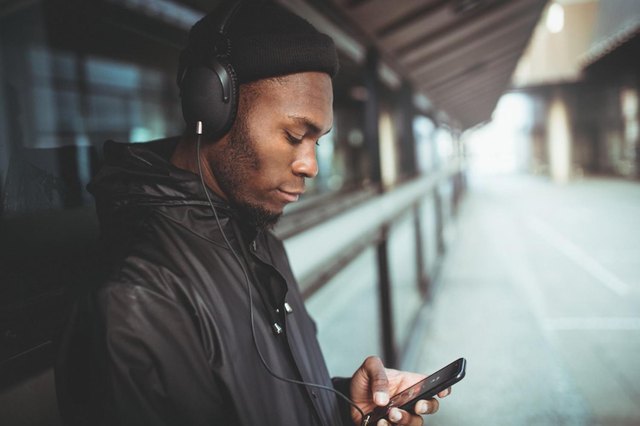
Advertisements
Many of us get so invested in our devices that it's hard to step away. In fact, one University of Maryland study found that "a clear majority" of participating students experienced distress when they tried to go without their devices for 24 hours. One in three people even admitted they'd rather give up sex than their smartphones! But as much as we love our phones and other screens, there's danger in excess. Check out these 10 habits that show how overuse and over-attachment to our technology may hurt more than help — and, in some cases, can do serious harm.
Credit: Twenty20/@criene1. Sleeping With Your Cell

It may be time to stop stowing your cell under the pillow. The California Department of Public Health (CDPH) has recommended that all cellphone users reduce their exposure to RF, the radio frequency energy that cellphones emit. Its guidelines cite studies indicating that "long-term, high use of cellphones may be linked to certain types of cancer and other health effects." Yikes! Although more research is needed, the CDPH suggests putting some distance between you and your phone by using Bluetooth headsets, texting instead of talking and carrying your phone in a purse or backpack instead of your pocket. And if you have to keep the phone near your head at night, switch it to airplane mode.
Credit: Twenty20/@JulieK2. Using a Grimy Phone

Phones get dirty fast. We touch them thousands of times a day, scrolling, tapping and swiping, depositing all kinds of particles and making them a breeding ground for germs. What happens when we press the phone to our face to answer a call? Dr. Annie Chiu, a dermatologist in Manhattan Beach, California, says her patients' telltale one-cheek patterns of acne or blackheads says it all. "Anytime there's pressing of oils and dirt against the face, it increases the likelihood of acne breakouts." Chiu's quick fix: Wipe down your phone daily with a tiny amount of sanitizer. Bonus points if you put your calls on speaker.
Listen now: Why America's Obsession With 'Happiness' Is Totally Stressing Us Out
Credit: Twenty20/@thequinoxfashion3. Social Media Overload

It's no surprise that, for teens, the phone is a portal into their social world: They spend hours on social media sharing photos, talking to friends and finding romance. But it's not all fun and games. Not only are cyberbullying and online aggression out there, but there is also a growing concern about frequent social media use being linked to depression. "Social media can be an escape," says Dr. Pamela Rutledge, director of the Media Psychology Research Center in Newport Beach, California. "And overuse is generally a manifestation of other more fundamental needs that aren't being met." She suggests that parents set a good example by advocating balance and "Don't villainize social media or you will close the lines of communication," she says. "Talking and listening, not lecturing, is key."
Credit: Twenty20/@WR364. Turbo Texting

"Text claw," "selfie elbow" and "iPad hand" are just a few of the made-up names for health complaints made by people who spend way too much time holding and typing on their devices. And although the terms are fake, the pain is real. Essentially, these all describe repetitive strain injuries, says NYC-based physical therapist Dr. Karen Litzy. An all-too-common diagnosis, the injuries are caused by remaining in one posture or positions too long. Decreasing time spent on electronic devices is her best advice, but when that's not possible, use voice-recognition tech or try quick and gentle hand exercises and stretches (called nerve glides) to ease the pain. Bottom line: "Your next position is your best position, so vary your posture as much as possible."
Advertisements
5. Texting While On the Move

Before you try to finish that text while crossing the street, consider this: According to the National Safety Council, distracted walking injuries are on the rise, and in 2016, the number of pedestrians killed in traffic increased by 11 percent — the biggest single-year jump ever. While reports don't call out the number caused by being on the phone, nearly four out of 10 Americans say they have witnessed a distracted walking incident, and 26 percent say they have been in an incident themselves, according to an American Academy of Orthopaedic Surgeons report. The smart solution is obvious: Don't do it. But if a message or call can't wait till you get to your destination (really?), consider an app that reads messages to you — and then use voice-recognition software to compose your response.
Credit: Twenty20/@gentsamongmen6. Bingeing Before Bed

By now we've all experienced the satisfaction of a good TV bing. But even good binges go bad, leading to insomnia and nightmares. Some studies suggest that people who binge have more problems sleeping than those who watch regular TV. What's the difference? Binge shows capitalize on cliffhangers that stimulate "cognitive arousal," says Jan Van den Bulck, Ph.D., professor of communication studies at the University of Michigan. It's that feeling of alertness from being sucked into a story so deeply that we may feel emotionally displaced when it's over and left craving more. Bingeing itself is not bad, Van den Bulck notes. "The problem comes in when you can't stop the binge and have trouble going to sleep afterward," he says. His suggestion? If a particular show triggers you, try setting a timer to limit viewing. Or just watch it on a day off, reserving weekday evenings for "safer" shows.
Credit: Twenty20/@Terralyx7. Working/Watching Without Breaks

The (well-documented) health dangers of being too sedentary include obesity, Type 2 diabetes and heart disease. That's why it's especially important for those who spend their days sitting at a computer and/or nights lounging with the latest Netflix series to get up and move. "As a society, we love technology, but it's really crucial to take a break," says Karen Jacobs, a clinical professor in occupational therapy at Boston University and a board-certified professional ergonomist. In the workplace, she recommends sit-stand desks for better health. And for those who don't stand at work, taking a break every 20 minutes is key, even if you find yourself "in the zone." It's all about "making a mindful decision that taking a break is good for your health," she says. Even better? Going outside. Research shows that even five minutes of exercise in a green space like a park or nature trail can benefit mental health.
Credit: Twenty20/@masterone8. Super-Scrolling

Feeling queasy, dizzy and headachy after looking at your screen? The phenomenon, which has been dubbed cybersickness, can affect 50 to 80 percent of people not typically prone to motion sickness, studies say. It's related to the feeling that some people experience when riding in vehicles and even when "trying to read the intro at the beginning of 'Star Wars' movies," says Christopher J. Quinn, O.D., president of the American Optometric Association. He says it happens when the brain is trying to deal with mismatched sensory input: The head may be still, but your vision perceives movement. It typically happens when quickly scanning social feeds, so if that's your M.O., Quinn suggests that it may be time to slow your scroll.
Credit: Twenty20/@CassMcD9. Googling Your Worst Fears

Are you a cyberchondriac? This decidedly unofficial term has been coined to describe someone who spends so much time online searching symptoms and illness that it interferes with work and relationships. While most of us will never reach that level, one study found that too much DIY online diagnosis may lead to increased anxiety. So how do you calm a late-night "brain cancer" search that leaves you a little freaked out? "The key is to triangulate information rather than stop at the first scary diagnosis," saysDr. Pamela Rutledge, director of the Media Psychology Research Center in Newport Beach, California. "And then, if symptoms are meaningful, check with your doctor in person."
Credit: Twenty20/@mattmylesphoto10. Warming Up to Your Laptop

Yes, they were designed to be put on your lap, but for men hoping to reproduce naturally, research suggests that keeping computers far from your groin area is a healthy idea. An American Society for Reproductive Medicine study showed that keeping a laptop connected wirelessly to the Internet near the testes may result in decreased male fertility. This echoes other research (mostly about using hot tubs and saunas) that also links excessive heat near the genitals to less vital sperm. So for guys wanting to start a family, it's back to the desktop.
Credit: Twenty20What Do YOU Think?

Advertisements
Have you experienced any of the above health issues? How have you dealt with limiting your time on devices, and have your methods been successful? Share your experiences in the comments section below.
Credit: Twenty20/@criene




Comments